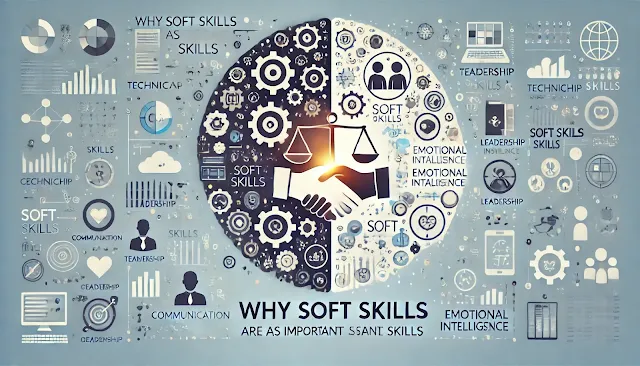 |
| Why Soft Skills Are as Important as Technical Skills |
In today’s fast-paced and competitive world, mastering technical skills is no longer enough. While technical skills help you perform your job, it’s soft skills that drive your success and career growth. From effective communication to teamwork and problem-solving, soft skills are the backbone of personal and professional development.
What Are Soft Skills?
Soft skills are interpersonal and communication-based abilities that enable you to interact harmoniously and effectively with others. Unlike technical skills, soft skills are not job-specific but universally valuable. Key examples include:
- Communication
- Teamwork
- Time Management
- Adaptability
- Problem-Solving
- Leadership
These skills shape how well you work with others, adapt to new situations, and solve challenges both within and beyond the workplace.
Why Are Soft Skills Important?
1. Communication Creates Connection
Technical expertise will get you noticed, but effective communication will help you stand out. Whether you are presenting ideas, negotiating with clients, or collaborating with teammates, clear communication ensures your message is understood.
2. Soft Skills Boost Teamwork
No one works in isolation. Whether in a small team or a large organization, the ability to collaborate and work harmoniously with others is crucial. Good teamwork creates better outcomes, higher morale, and a more productive workplace.
3. Adaptability in a Changing World
In the tech world, tools and technologies evolve rapidly. Soft skills like adaptability and emotional intelligence allow you to adjust to these changes, embrace new challenges, and stay ahead of the curve.
4. Employers Are Looking for Well-Rounded Talent
Organizations are no longer just hiring for technical proficiency. They want individuals who can think critically, lead projects, and build relationships. A candidate with strong soft skills will always have an edge over one who lacks them.
5. Soft Skills Enhance Problem-Solving
Technical skills help you address how to fix a problem, but soft skills like critical thinking and creativity enable you to understand why the problem occurred and how to prevent it in the future.
The Perfect Balance: Technical Skills + Soft Skills
To thrive in any career, you need a balance of technical skills and soft skills. For example:
- An excellent programmer who can’t explain their code struggles in collaborative teams.
- A great marketer who lacks communication skills will miss out on client opportunities.
The perfect employee is someone who not only has the hard skills to get the job done but also the soft skills to make the workplace better for everyone.
How to Develop Soft Skills?
Unlike technical skills, soft skills are often built over time through consistent effort and real-world experience. Here are a few ways to improve them:
- Practice Communication: Join public speaking groups, participate in debates, or present ideas regularly.
- Improve Time Management: Use tools like calendars, task lists, and productivity apps.
- Seek Feedback: Ask for honest feedback from peers, mentors, or managers.
- Learn Emotional Intelligence: Practice empathy, listen actively, and control your emotions in tough situations.
- Take Online Courses: Platforms like Coursera, LinkedIn Learning, and Udemy offer soft skill development programs.
Conclusion: Soft Skills Are Your Competitive Edge
In a world driven by automation and AI, soft skills remain uniquely human. While technical expertise will always be valuable, soft skills are what set you apart as a leader, a problem-solver, and a valuable team player.
Whether you’re a student, a developer, or an aspiring leader, remember this: Mastering soft skills is just as critical as sharpening your technical skills.
Comments
Post a Comment